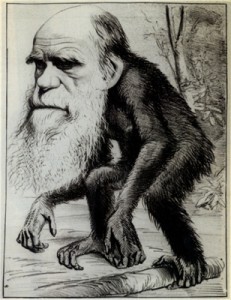At a popular level, many people seem to think that evolution effectively disproves God’s existence. Certainly, it could be argued that evolution undermines design arguments based on the existence of intelligent life, although we have disputed that idea in a previous article. But the idea that evolution could achieve more than that and become an all-encompassing argument for atheism just doesn’t get off the ground at all.
 Here we want to highlight some things that evolution doesn’t explain. The list could certainly be extended, but all six of the points listed are relevant to the existence of intelligent life. Of course, it will be obvious that evolution doesn’t explain most of these points (the first four) since it is not intended to, but it is still important to mention them because they highlight how incomplete evolution is on its own as an explanation for intelligent life. This is not a criticism of evolution, but is simply a matter of recognizing its limits. For those interested in how we think Christians should approach evolution see our article Debating Darwin.
Here we want to highlight some things that evolution doesn’t explain. The list could certainly be extended, but all six of the points listed are relevant to the existence of intelligent life. Of course, it will be obvious that evolution doesn’t explain most of these points (the first four) since it is not intended to, but it is still important to mention them because they highlight how incomplete evolution is on its own as an explanation for intelligent life. This is not a criticism of evolution, but is simply a matter of recognizing its limits. For those interested in how we think Christians should approach evolution see our article Debating Darwin.
With that in mind, here are six things evolution doesn’t explain:
1. An orderly universe with suitable physical laws.
Evolution couldn’t operate without appropriate physical laws in place, yet clearly evolution cannot explain why such laws apply to our universe. As we discuss here, this feature of the universe provides one reason for belief in God.
2. A fine-tuned universe, including initial conditions and physical parameters necessary for carbon-based life.
Our existence is widely recognized by scientists, whether they believe in God or not, as depending on the fine-tuning of the universe and needless to say, this cannot be explained by evolution either. This feature of the universe provides a further reason for belief in God as we discuss here.
3. A suitable planet, such as Earth, orbiting a suitable star and capable of supporting life.
The ‘Rare Earth’ hypothesis claims that our planet has a range of remarkable properties that make it suitable for life and that planets with such properties are very rare indeed in the universe. These properties include its distance from its parent star (its so-called habitable zone), its location within the right kind of galaxy, a suitable arrangement of other planets, plate tectonics, etc. Some dispute the claim that planets like ours are so rare. Research on exoplanets could in principle help to address this point, but claims that Earth-like planets have been found are typically based on one or two features such as being in the habitable zone and fall a long way short of showing that they could support life. Furthermore, if it turns out that they don’t have life, that could strengthen the claim that conditions on Earth are very rare. Whatever turns out to be the case, it is clear that evolution requires, but cannot explain, the suitable environment on Earth.
 4. The existence of life in the first place.
4. The existence of life in the first place.
Biological evolution requires life to exist in the first place before it can get to work, so clearly it cannot explain the origin of life. Scientists have proposed many alternative explanations for the origin of life, but all face enormous challenges in accounting for even the simplest living organisms. The term chemical evolution is often used in this context to refer to the proposed processes involved in the production of life from non-living molecules and sometimes to a process analogous to biological evolution involving replication, variation and selection. However, while biological evolution is generally accepted by scientists, there is no such agreement about the processes involved in chemical evolution. Undoubtedly, the origin of life involved a remarkably unique set of circumstances including, but not limited to, those mentioned in points 1 – 3 above. Even in the most optimistic scenarios, the development of life is very improbable. We are certainly not recommending that scientists give up their research in this area, but are simply highlighting the fact that evolution requires, but once again does not explain, the origin of life.
5. Various lucky accidents along the way.
However life got started, it is clear that evolution still faced enormous challenges. Most scientists do not think evolutionary processes made the existence of complex, intelligent living organisms inevitable. To take one example, consider the transition from prokaryotic to eukaryotic life, which was crucial for more complex life. Even Richard Dawkins seems to think this required a remarkable stroke of luck, suggesting that it may have been “an even more momentous, difficult and statistically improbable step than the origin of life.”[1] If this is right then it, along with other improbable evolutionary transitions, means that it is entirely possible that nothing more complex than bacteria would ever have evolved. As Nick Lane explains “never-ending natural selection, operating on infinite populations of bacteria over billions of years, may never give rise to complexity. Bacteria simply do not have the right architecture…”[2] We emphasize that this point is accepted by many evolutionary biologists and so it is not intended as a criticism of evolution, but it does highlight limitations in terms of what evolution explains.
6. Consciousness.
Attempts to explain the origin of consciousness in purely physical terms, let alone evolutionary terms, have serious problems as we have argued in other articles. And many atheists agree, including the eminent philosopher Thomas Nagel. In his book Mind and Cosmos (OUP, 2012, pp. 44-45) he writes
… since the conscious character of these organisms is one of their most important features, the explanation of the coming into existence of such creatures must include the explanation of the appearance of consciousness … An account of their biological evolution must explain the appearance of conscious organisms as such.”
Nagel’s point is essentially that because consciousness is an important aspect of life on Earth, evolution cannot claim to adequately explain life on Earth unless it can explain not just the physical aspects of living organisms but also consciousness. Even if one wishes to claim that evolution will explain consciousness in the future – a claim which we think there are excellent reasons for rejecting – it is clear that it is another example of a phenomenon related to life that evolution does not explain and so it provides another limit on its scope.
Our argument here is not intended as an attack on evolution nor have we attempted to argue that God’s existence explains all six features of our universe.[3] Our point is rather to highlight some limits of evolution as a complete explanation for life, which also show why it is extremely weak as a reason for rejecting God.
[1] Richard Dawkins, The God Delusion (London: Bantam, 2006), p.140.
[2] Nick Lane, “Life: Inevitable or fluke?” New Scientist, 21 June 2012.
[3] We do, however, think that at least the first two provide strong evidence for God’s existence and that a number of the others fit much more easily within a theistic universe than an atheistic one.
